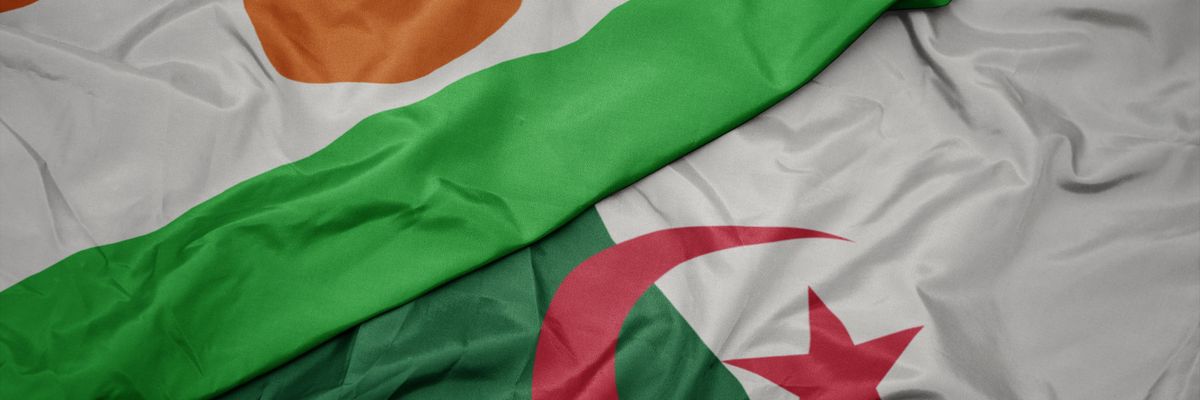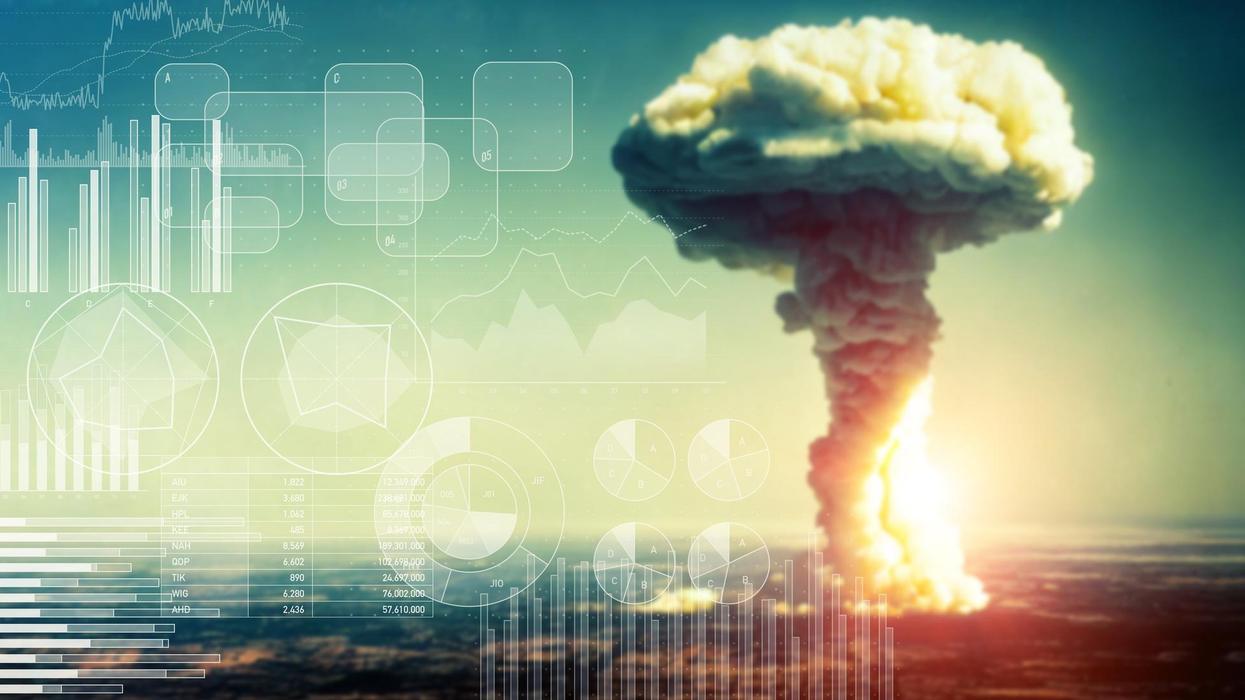Niger’s July 26 military coup, which ousted President Mohamed Bazoum, has created a volatile situation. While France and the Economic Community of West African States (ECOWAS) threaten military action against the Nigerien junta under the guise, respectively, of protecting French diplomatic and military facilities and restoring Niger’s constitutional order, the crisis risks escalating into a regional conflict.
Each of Niger’s seven neighbors has a unique set of interests and perspectives on Niger’s situation. Algeria, which shares a 620-mile border with Niger, is focused on promoting stability and a return to Niger’s constitutional order while also preventing foreign powers from violating the country’s sovereignty.
Algiers is concerned about instability spilling into neighboring countries (including Algeria) and violent extremists exploiting the turmoil in Niger itself. Memories of Algeria’s “Black Decade” (1991-99), in which a jihadist insurgency and a state-led crackdown led to much bloodshed, remain vivid in Algerian minds. No Algerian takes peace and stability at home for granted.
“National security officials in Algiers already have their hands full due to increasing tensions with Morocco to the west, continued instability in Libya to the east, and the worsening economic situation in Tunisia, also to the east,” Gordon Gray, the former U.S. ambassador to Tunisia, told RS. “Uncertainty to the south, i.e., along the border with Niger, is yet another problematic development they will need to deal with.”
In 2012, three hardline jihadist terrorist groups — al-Qaida in the Islamic Maghreb, the Movement for Oneness and Jihad in West Africa, and Ansar Dine — gained control of two-thirds of Mali, including territory bordering Algeria. Algerians worried about these armed extremists’ ability to threaten Algeria’s security. The 2013 In Amenas hostage crisis further informed Algeria’s understandings of its vulnerability to transnational terror groups operating in neighboring countries. Today, Algerian officials have similar concerns about instability in Niger creating opportunities for the ISIS- and al-Qaida-linked terrorist groups operating in the country to wage attacks throughout the region.
Algerian officials also worry about the devastating impact that the situation could have on Niger’s 25 million people. ECOWAS-imposed sanctions on Niger in the wake of the July 26 coup do not include humanitarian exemptions, and Algeria’s government worries that political turmoil and a worsening economic situation in Niger could prompt refugee flows into Algeria and other neighboring countries, further threatening regional stability.
Algeria’s concerns about Niger’s crisis go beyond the threat of terrorism and worsening humanitarian disasters. Although in favor of restoring Niger’s constitutional order, Algiers strongly opposes military intervention by foreign forces.
“Algeria opposes all kinds of external intervention in North Africa and the Sahel, whether it is military or political. Algiers stands firm by the principle of sovereignty and considers any foreign presence in its neighborhood as an infringement on the local countries' sovereignty, regardless of the nature of the foreign intervention or presence,” Ricardo Fabbiani, North Africa project director for the International Crisis Group, told RS.
“For Algeria, a military intervention against Niger would be a catastrophe. The Algerians point out that the previous interventions in Libya and Mali have exacerbated pre-existing problems, rather than solving them,” he added. "These operations have a significant political and security impact, with repercussions that can be felt for decades.”
In this sense, Algeria occupies a somewhat unique position — at odds with both France and ECOWAS threatening to wage a military campaign to reverse the coup on one side, and Burkina Faso and Mali vowing to militarily assist Niger’s junta if ECOWAS attacks on the other.
Seeing itself as a regional heavyweight, Algeria’s sensibilities and principles guide the country’s foreign policy. Having existed as a French colony before waging a war for independence (1954-62), Algerians view national sovereignty as sacrosanct. This history helps one understand the North African country’s past opposition to foreign interventions in Libya, Iraq, Mali, and Syria.
Viewing itself as a vanguard in anti-imperialist, pan-African, and Arab nationalist causes, Algeria will always oppose Western (especially French) military intervention in Africa, the Middle East, or anywhere in the Global South. Whereas many states evolve in their foreign policy strategies, Algeria’s firm commitment to certain principles, concepts, and institutions has remained consistent over the decades, making Algiers’ stance vis-a-vis Niger both predictable and characteristic.
Within this context, Algeria is playing a leading role in advocating for a diplomatic solution to the Nigerien crisis that prevents any external military intervention. Last month, Foreign Minister Ahmed Attaf visited three ECOWAS member-states — Nigeria, Benin, and Ghana — on orders from President Abdelmadjid Tebboune. After the visits, Attaf proposed a six-month transition plan to bring civilian rule and democracy back to Niger.
He stressed Algeria’s opposition to foreign military intervention and affirmed that external actors will be barred from transiting Algerian airspace as part of any intervention. The six-point plan’s objective is to “formulate political arrangements with the acceptance of all parties in Niger without excluding any party” within the six-month-window, according to Algeria’s top diplomat, who has also had contacts with junta members, as well as Nigerian civilian leaders. Overseeing this process should be a “civilian power led by a consensus figure.”
Before Attaf announced Algeria’s plan, Niger’s military leadership, backed by Burkina Faso and Mali, laid out its own very different plan. The junta called for a three-year transition period to restore constitutional order. ECOWAS has summarily rejected that plan, asserting that three years is much too long. Some members even called the junta’s proposal a “provocation.”
Algeria is hoping that its proposal offers a middle ground that saves face on all sides but also leads to a restoration of democracy in Niger while preventing any military action against the landlocked and sanctioned country.
Fortunately for Algeria, there is growing international support from foreign governments, such as Italy’s, for its mediation efforts as the standoff over Niger intensifies. “If successful, this diplomatic effort could strengthen Algeria's role in the Sahel, which is one of Algeria's long-term goals in the area,” said Fabiani.
Washington has not yet taken a position on Algeria’s plan and has generally followed a more cautious approach than Paris, a source of irritation between the two NATO allies. Despite an early unsuccessful mission by a top State Department official to engage the junta, the U.S. has thus far declined to label Bazoum’s ouster a “coup,” a legal determination that would require the U.S. to end military aid to Niamey, a key counterterrorism partner in the Sahel for years.
“The United States remains focused on diplomatic efforts toward a peaceful resolution to preserve Niger’s hard-earned democracy,” a State Department spokesperson told RS. “We all want a peaceful end to this crisis and the preservation of the constitutional order.”
Looking ahead, officials in Algiers understand that they must address the Nigerien crisis pragmatically while accepting the limitations of Algeria’s influence in Niamey. Algerian policymakers are “working on a shortened timeline for the transition” and Algiers “thinks that the coup is difficult to reverse,” which leaves them believing that “the quickest route out of this predicament is by accelerating the transition announced by the military junta and guaranteeing Bazoum's personal safety,” explained Fabiani. “Yet, it is unclear what leverage Algeria has to make this happen and, most importantly, how willing to listen are the military authorities, given the regional polarization around this issue.”
“Today, Algiers doesn't want to antagonize the military junta in Niger, nor does it want to push for a military intervention,” Dalia Ghanem, a Middle East and North Africa Senior Analyst at the European Union Institute for Security Studies, told RS. “Yet, Algiers learned that this noninterference stance is no longer efficient because it leaves the door open to foreign meddling like in Libya. The country’s [leadership is] hence stuck between an old doctrine and the new regional realities. The country had no other [option] than [to] maximize security at its borders and this can't be done without hard choices being taken.”
In the public eye, Algeria will continue investing diplomatic energy into its six-month transition plan. Yet, as Gray told RS, “Behind the scenes, Algeria will be seeking ways to cooperate with the military junta to ensure the security of its southern border.”
















